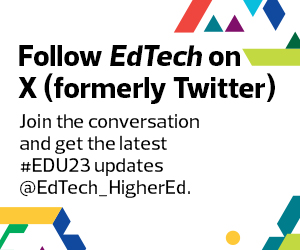Every year, the EDUCAUSE Top 10 report outlines the biggest trends, opportunities and challenges in higher ed IT, covering the higher education IT workforce, teaching and learning, emerging technologies, and more.
Susan Grajek, vice president of partnerships, communities and research at EDUCAUSE, presented this year’s list at the organization’s annual conference in Chicago. The report features input from a panel of higher education leaders and focuses on the concept of institutional resilience.
“What we’re going to see in 2024 is that institutional leadership will be looking to technology leaders, looking to use data and technology to increase institutional resilience and to increase operational, financial and mission resilience,” Grajek tells EdTech. This year’s panel looked at the International Standards Organization framework that defines organizational resilience along with other frameworks to create a definition for institutional resilience in higher education.
Click the banner below to follow along with all of our coverage from the 2023 EDUCAUSE Conference.
Grajek shared that definition in her EDUCAUSE presentation: “the ability to anticipate, respond to and adapt to rapidly changing circumstances in ways that maximize opportunities and minimize impacts of unforeseen events.”
How To Achieve Operational Resilience In Higher Education
According to Grajek, operational resilience is a key component of institutional resilience.
“Operational resilience extends to the institution’s assets and workforce and to its planning, risk management and decision-making processes,” Grajek said in her presentation.
Check out the video below to learn how the top 10 IT issues list has evolved.
The IT issues that contribute to operational resilience in higher education are:
- Cybersecurity as a Core Competency. Adopting a formal risk management framework can help institutions balance cost, risk and opportunity.
- Driving to Better Decisions. Improving data quality and governance can help lead to more informed decision-making.
- Hiring Resilience. Developing an employee value proposition can help human resources leaders recruit and retain IT talent under adverse circumstances.
- Adapting to the Future. Cultivating institutional agility means preparing for a range of possible future scenarios.
LEARN MORE: What are the keys to success with a generative AI platform?
Financial Resilience Helps Contribute to Overall Institutional Success
As technology costs rise, higher education institutions must seek opportunities to address financial risks and minimize costs.
“Technology can be both the cost and efficiency driver as well as a value enabler,” Grajek said. “When you factor in the decision support affordances of data, technology leaders become powerful partners in improving financial resilience.”
The IT issues that contribute to financial resilience in higher education are:
- Administrative Cost Reduction. Streamlining processes, data and technologies can lead to cost savings.
- Financial Keys to the Future. Using data to develop financial models and projections can help higher ed leaders make tough choices.
- Balancing Budgets. Building strong relationships with solution providers and industry partners can help institutions take control of IT costs and vendor management.
Click the banner below to access exclusive content as an Insider.
Mission Resilience Focuses on the Student Experience
The concept of mission resilience is focused on the student journey, beginning with recruitment and extending through after a student leaves an institution.
“Institutional missions — most commonly education, research and service — are enduring, but their expression and advancement must adapt to the needs and opportunities of the times,” Grajek said.
The IT issues that contribute to mission resilience in higher education are:
- The Enrollment Crisis. Data can help higher education institutions make decisions about their course offerings to identify prospective students or tap into new markets.
- Diving Deep into Data. Analytics can help institutions harness actionable insights to improve learning and student success.
- Meeting Students Where They Are. Giving students universal access to campus services can lead to better outcomes.
EXPLORE: How can generative AI be used in higher ed?
What Is Artificial Intelligence’s Role in the Future of Higher Education?
Grajek noted that one issue is notably absent from this year’s top 10 list: artificial intelligence. In fact, the institutional approach to AI ranked number 13 on the list of IT issues, so EDUCAUSE gave it an honorary spot in this year’s report.
“The real questions that we are advising institutional leaders to answer are: How do we adapt the institution to AI?” Grajek tells EdTech. “How do we integrate AI into the institutional missions and business models? It’s really a dialectical approach. How do we get into conversation with AI so that we understand it? That is going to be particularly important for our IT leaders.”
In her EDUCAUSE presentation, Grajek noted that AI makes knowledge and expertise available in ways they haven’t been in the past.
“It has the potential to help people skill up rapidly, including those who traditionally lacked access to effective educational opportunities and resources,” she said. “AI can potentially help reduce administrative costs if applied to administrative processes, job descriptions, project charters, meeting summaries, and onboarding and training. Academic applications may include assessment reform, developing course materials for introductory level courses and tutoring. We will almost certainly create more and more powerful use cases in the coming months and years.”
Keep up with EdTech: Focus on Higher Education’s coverage on our EDUCAUSE event page and via X (formerly Twitter).













